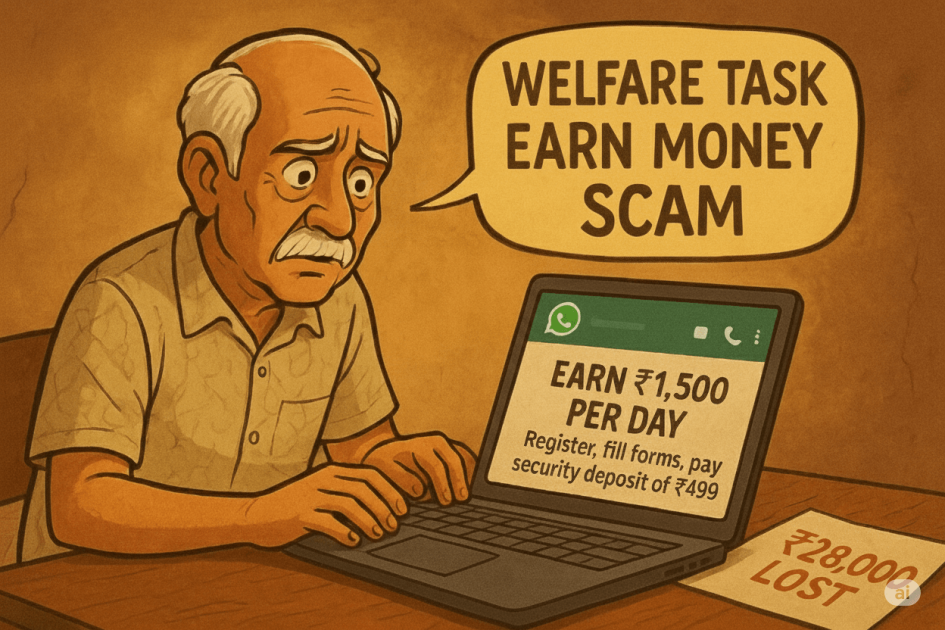A few months ago, an elderly man from Pune received a WhatsApp message from someone claiming to represent a national NGO working for women’s welfare. They said he could “earn ₹1,500 per day by completing simple welfare verification tasks online.” All he had to do was register, fill a few forms, and pay a small “security deposit” of ₹499.
He did it. Within days, they asked him for more — “processing fees,” “data verification charges,” “tax clearance.”
By the time he realized it was a scam, he had already lost ₹28,000.
Sounds unbelievable?
Sadly, it’s becoming one of the most common online scams in India, the Welfare Task Earn Money Scam.
These fraudsters don’t always use the same story. Sometimes they pose as NGOs, other times as government-sponsored employment programs or digital community welfare projects.
But the pattern is the same: they lure people with small tasks and easy cash, then slowly drain their wallets and harvest their personal data.
How the Welfare Task Scam Operates?
Most of these scams start innocently — a message, a social media post, or a call from someone claiming to be part of an NGO or government department. Here’s how it usually plays out:
1. The Bait
You’re told about an opportunity to earn quick money by helping with social welfare activities, like verifying rural beneficiaries, collecting feedback, or promoting government awareness campaigns.
They send links to professional-looking websites or apps with official-sounding names — like “Welfare India Digital Task Portal” or “Swasth Bharat Online Work.”
2. The Trust-Building Phase
To make it look real, scammers share registration forms, ID cards, or even fake appointment letters. Some will show you screenshots of “people who got paid” to make the scheme look credible.
You might even receive ₹100–₹200 initially as “task completion bonuses”, just to hook you.
3. The Trap
Soon after, you’ll be asked to pay “processing fees,” “GST,” or “security deposits” to unlock higher-paying tasks.
Once you make the payments, the scammers either disappear or keep asking for more, promising that your “big payment” is just one final step away.
Some even trick people into sharing Aadhaar cards, PAN numbers, or bank details, which are later used for identity theft.
How It differs from Regular Task-Based Scams?
You might be thinking, “Isn’t this just like those fake online task apps?”
Not quite — here’s how welfare task scams stand out:
| Aspect | Welfare Task Scam | Typical Task-Based Scam |
| Theme | Poses as NGO or government project | Claims to be a business or marketing gig |
| Emotional Hook | Uses social causes like women’s empowerment or poverty relief | Promises easy online income or freelancing work |
| Victims Targeted | Older adults, homemakers, job seekers | Students, gig workers, freelancers |
| Risk | Financial loss + identity theft + legal misuse of your data | Mainly financial loss or wasted time |
| Tactics | Fake welfare IDs, official seals, “project coordinator” chats | Fake websites, referral bonuses, frozen withdrawals |
The emotional layer is what makes welfare scams so dangerous — they exploit trust and empathy, not just greed.
Real-Life Red Flags to Watch Out For
- Messages or calls claiming to be from NGOs, welfare departments, or CSR projects that offer quick pay.
- Requests for “security deposits,” “registration fees,” or “tax clearance” before payment.
- Social media ads using names like “Digital India Welfare Program,” “PM Task Scheme,” or “Helping Hand Foundation.”
- Fake payment proofs shared in group chats to build confidence.
- Requests for Aadhaar, PAN, or bank details under the pretext of “ID verification.”
How to Report Task Scams in India?
If you’ve been scammed or even approached by these so-called Welfare Task offers, don’t stay silent.
Reporting helps stop these networks and protects others.
Here’s what you should do:
1. Report on the National Cyber Crime Portal
- Register & log in using credentials
- Enter all the details: screenshots, chat logs, payment IDs, and links.
- Include the phone numbers or bank details the scammer used.
The more evidence you attach, the easier it becomes for the cyber police to track them.
2. File an FIR at Your Local Police Station
Take all your proof — screenshots, transaction receipts, UPI records — and visit your local police station. Ask them to register an FIR, not just a complaint. This ensures your case is officially recorded and can be tracked.
3. Inform Your Bank
If you shared your card, UPI, or account details, contact your bank right away. Request to block your account or freeze recent suspicious transactions.
Need Help?
Register with us, and we will guide you through the process to report the complaint online on the respective platform.
To date, we have helped thousands of victims and recovered more than ₹4 crores in total.
Conclusion
Scams like these thrive because they hide behind good intentions — helping others, doing welfare, being part of something noble. That’s why they’re so effective.
The next time you get a message saying you can “earn by helping others,” pause for a moment. Real NGOs or government programs don’t ask you to pay to participate. And no genuine welfare task will ever require you to deposit money upfront or share your ID for “verification.”
Stay cautious. Stay skeptical. And if something feels off, report it immediately.
Helping others is good.
But helping scammers — even unknowingly — can cost you your peace of mind, your savings, and your identity.







